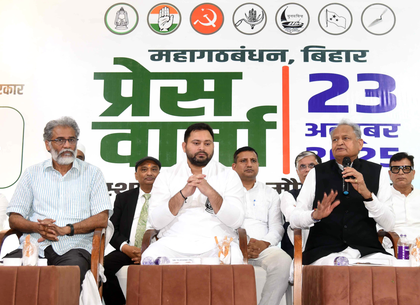Oppn endorses ‘son-rise’ in Bihar: Tejashwi following father Lalu, mother Rabri Devi
By IANS | Updated: October 23, 2025 17:20 IST2025-10-23T17:17:56+5:302025-10-23T17:20:17+5:30
New Delhi, Oct 23 End-August, when Rashtriya Janata Dal (RJD) de-facto chief Tejashwi Yadav declared himself the chief ...

Oppn endorses ‘son-rise’ in Bihar: Tejashwi following father Lalu, mother Rabri Devi
New Delhi, Oct 23 End-August, when Rashtriya Janata Dal (RJD) de-facto chief Tejashwi Yadav declared himself the chief ministerial face of the party in the upcoming Assembly polls in Bihar, Congress leader Rahul Gandhi, present on the occasion, remained silent.
Two months later, it was Congress emissary Ashok Gehlot who announced Tejashwi’s name as the Mahagathbandhan’s choice for the Chief Minister's job.
It followed days of hectic parleys with alliance constituents, including Tejashwi’s father and former Chief Minister Lalu Prasad Yadav.
During the string of meetings, Vikassheel Insaan Party (VIP) leader Mukesh Sahani was largely acknowledged as the group’s Deputy chief ministerial candidate.
Sahani had been unhappy as he was granted almost a quarter of the total seats he intended the VIP to contest in alliance with the Mahagathbandhan. In return, he was assured the Deputy Chief Minister’s post and one Rajya Sabha seat for his party in the future.
Ashok Gehlot – with the support of his central leaders, especially Rahul Gandhi – and the Communist Party of India (Marxist Leninist) Liberation General Secretary Dipankar Bhattacharya, are said to have had a role in placating the VIP.
However, they could not persuade alliance candidates on the ground, pitted against each other in about 10 constituencies at the last count.
Mahagathbandhan leaders chose to dismiss these as a “friendly fight in five or ten seats”, which they consider “no big deal” among Bihar’s 243 Assembly constituencies.
With the last date for withdrawal of nominations for the first phase of elections already over, and the second ending today, the situation may not be changed in this limited time.
Big deal or not, but in the 2020 Assembly elections, the RJD emerged as the state’s single-largest party with 75 seats – just one more than the Bharatiya Janata Party (BJP).
The BJP is currently part of the National Democratic Alliance (NDA) government in Bihar, led by the Janata Dal (United) chief Nitish Kumar as its Chief Minister.
For Tejashwi Yadav, the path to power lies through these intra-alliance frictions and seat-sharing squabbles which may carry into the time of building his Cabinet – in case of a favourable mandate.
Out of a probable two dozen or so ministers he can appoint, only the chief and the deputy have been finalised now. Alliance partners would invariably vie for prized departments. Before that happens, Tejashwi now has to retain the RJD’s present voter base of Muslim-Yadav.
VIP supporters among riverine and fisher communities (Nishad, Mallah, and other groups) and segments of Backward-Class voters, along with the Left’s presence in sections of poorer and backward voters, may complement the RJD.
Then there is the Congress, drawing support from a mix of social groups and regional pockets. However, the alliance may be able to consolidate Muslim, Yadav, and a section of OBC votes.
In the meantime, with the resignation of 50 RJD leaders from the Extremely Backward Cell in Darbhanga, alongside a high-voltage campaign launched by the BJP, with top figures like Amit Shah and J.P. Nadda hitting the ground, Tejashwi’s path may not be smooth.
Also, his allies are parties which have been politically and historically opposed to each other. Lalu himself rose from anti-Congress movements. He had deftly handled the Mandal Commission outcome to his favour with cries of “social justice” that punctured the rising balloon of the Left movement that stuck to “class struggle”, ignoring caste.
However, a generation later, electoral interest has weighed upon social objectives, theoretical beliefs, and changed political equations.
Additionally, the younger Yadav carries the “jungle raj” baggage from the previous administrative and corruption allegations linked to his family, which remains an opening for the NDA to exploit.
If he overcomes all obstacles to become Chief Minister, he will be the third from his family, following in the footsteps of his father Lalu Yadav, and mother Rabri Devi in earlier governments. However, Tejashwi has not been one to deny that his position is a result of his family, or nepotism.
Disclaimer: This post has been auto-published from an agency feed without any modifications to the text and has not been reviewed by an editor
Open in app